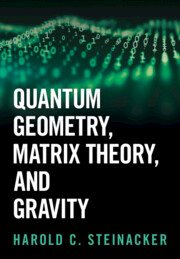Book contents
- Frontmatter
- Dedication
- Contents
- Preface
- Part I Mathematical background
- Part II Quantum spaces and geometry
- Part III Noncommutative field theory and matrix models
- 6 Noncommutative field theory
- 7 Yang–Mills matrix models and quantum spaces
- 8 Fuzzy extra dimensions
- 9 Geometry and dynamics in Yang–Mills matrix models
- 10 Higher-spin gauge theory on quantum spacetime
- Part IV Matrix theory and gravity
- Appendix A Gaussian integrals over matrix spaces
- Appendix B Some SO(D) group theory
- Appendix C Torsion identities
- Appendix D Some integrals
- Appendix E Functions on coadjoint orbits
- Appendix F Glossary and notations
- References and Further Reading
- Index
6 - Noncommutative field theory
from Part III - Noncommutative field theory and matrix models
Published online by Cambridge University Press: 04 April 2024
- Frontmatter
- Dedication
- Contents
- Preface
- Part I Mathematical background
- Part II Quantum spaces and geometry
- Part III Noncommutative field theory and matrix models
- 6 Noncommutative field theory
- 7 Yang–Mills matrix models and quantum spaces
- 8 Fuzzy extra dimensions
- 9 Geometry and dynamics in Yang–Mills matrix models
- 10 Higher-spin gauge theory on quantum spacetime
- Part IV Matrix theory and gravity
- Appendix A Gaussian integrals over matrix spaces
- Appendix B Some SO(D) group theory
- Appendix C Torsion identities
- Appendix D Some integrals
- Appendix E Functions on coadjoint orbits
- Appendix F Glossary and notations
- References and Further Reading
- Index
Summary
Noncommutative field theory is the analog of classical field theory on quantum spaces. We discuss both classical as well as quantum aspects of such field theories. In particular, a transparent understanding of the crucial phenomenon of UV/IR mixing is obtained using the novel tool of string modes. These exhibit the stringy nature of noncommutative field theory, and will play an important role in the following. In particular, noncommutative gauge theory is defined via Yang–Mills matrix models.
Keywords
Information
- Type
- Chapter
- Information
- Quantum Geometry, Matrix Theory, and Gravity , pp. 177 - 222Publisher: Cambridge University PressPrint publication year: 2024
